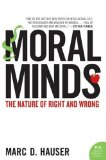 Marc Hauser’s book Moral Minds purports to travel much the same territory for morality that books like Steven Pinker’s The Language Instinct does for language — he argues that human beings are born with an innate moral capacity that is separate and distinct from other faculties (morality is not, for example, simply a byproduct of a general rational ability).
Marc Hauser’s book Moral Minds purports to travel much the same territory for morality that books like Steven Pinker’s The Language Instinct does for language — he argues that human beings are born with an innate moral capacity that is separate and distinct from other faculties (morality is not, for example, simply a byproduct of a general rational ability).
As Hauser sums it up in the prologue,
I argue that our moral faculty is equipped with a univeral moral grammar, a tookit for building specific moral systems. Once we have acquired our culture’s specific moral norms — a process that is more like growing a limb than sitting in Sunday school and learning about vices and virutes — we judge whether actions are permissible, obligatory, or forbidden, without conscious reasoning and without explicit access to the underlying principle.
Moreover, Hauser believes that we should go beyond merely describing such an innate moral faculty, but that in addition the existence of said moral faculty should be taken into account in policy making.
But does the book actually deliver? Briefly, no. The author complains in an afterword in the paperback version of the book about an early negative review from the late Richard Rorty in the New York Times (Hauser claims that the review was especially insulting because, Hauser claims, it was clear that Rorty hadn’t read the book). Having slogged through the book, I thought Rorty was pretty much spot on with his criticisms. Rorty wrote,
The exuberant triumphalism of the prologue to “Moral Minds” leads the reader to expect that Hauser will lay out criteria for distinguishing parochial moral codes from universal principles, and will offer at least a tentative list of those principles. These expectations are not fulfilled. The vast bulk of “Moral Minds” consists of reports of experimental results, but Hauser does very little to make clear how these results bear on his claim that there is a “moral voice of our species.”
. . .
Hauser thinks that Noam Chomsky has shown that in at least one area — learning how to produce grammatical sentences — the latter sort of circuitry will not do the job. We need, Hauser says, a “radical rethinking of our ideas on morality, which is based on the analogy to language.” But the analogy seems fragile. Chomsky has argued, powerfully if not conclusively, that simple trial-and-error imitation of adult speakers cannot explain the speed and confidence with which children learn to talk: some special, dedicated mechanism must be at work. But is a parallel argument available to Hauser? For one thing, moral codes are not assimilated with any special rapidity. For another, the grammaticality of a sentence is rarely a matter of doubt or controversy, whereas moral dilemmas pull us in opposite directions and leave us uncertain.
The book never comes close on delivering on the prologue’s claim about an innate moral faculty. Instead, much of the book is filled with a mind numbing discussion of Hauser’s particular framing of moral philosophy interspersed (which is Rawlsian, though he doesn’t make a convincing case even on that) with long catalogs of animal experiments that are somehow supposed to tie-in to the philosophy but never quite seem to (which isn’t to say that some of the experiments aren’t fascinating, they just don’t ever come close to demonstrating what Hauser sets out to convince the reader of).
All-in-all this book was bloody awful. Someday someone is going to write a classic book on the sociobiology of human morality. This, however, is not it.